新概念英语第二册动词课件(共55张PPT)
文档属性
| 名称 | 新概念英语第二册动词课件(共55张PPT) |  | |
| 格式 | pptx | ||
| 文件大小 | 14.8MB | ||
| 资源类型 | 教案 | ||
| 版本资源 | 新概念英语 | ||
| 科目 | 英语 | ||
| 更新时间 | 2025-05-21 16:44:12 | ||
图片预览

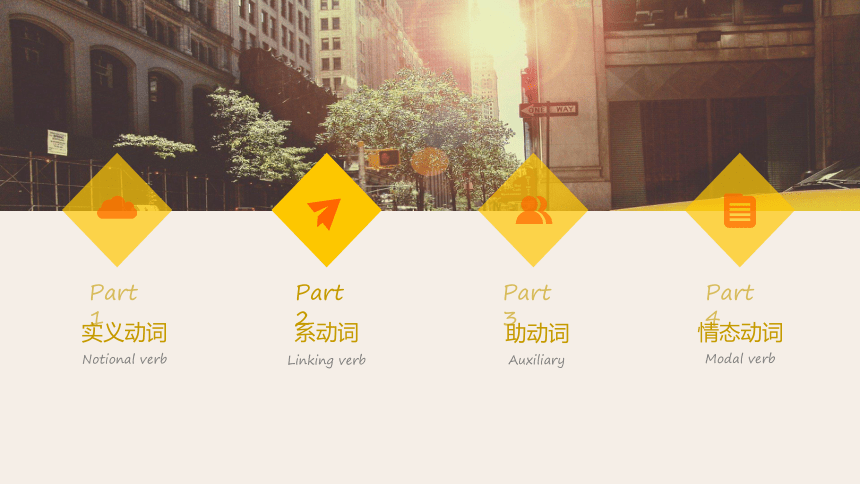
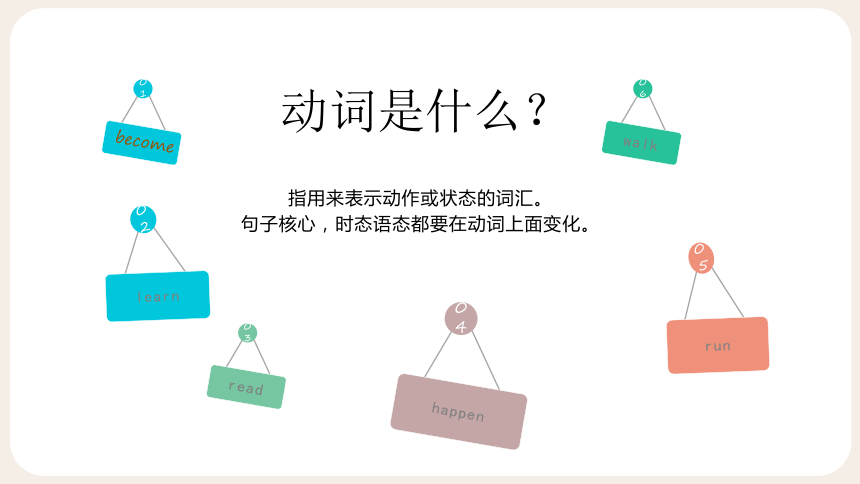
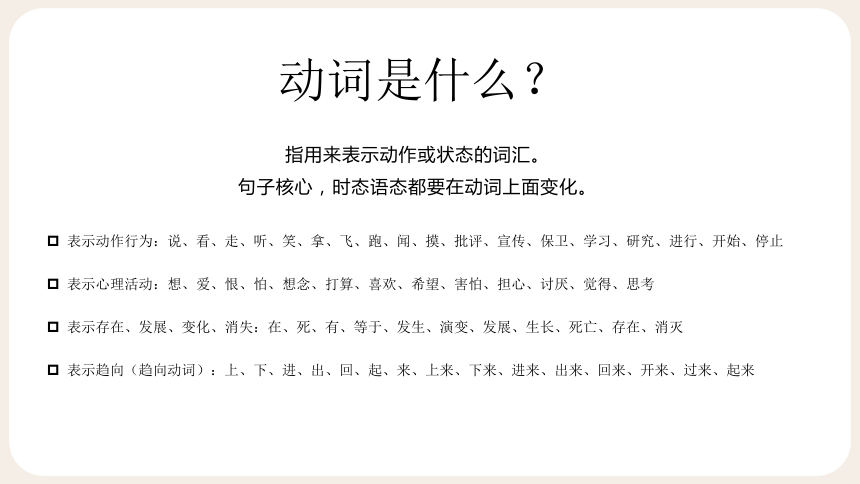
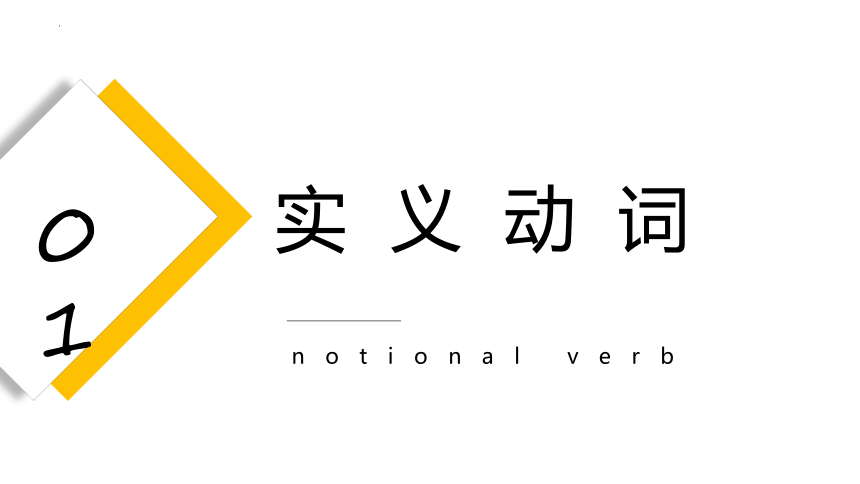
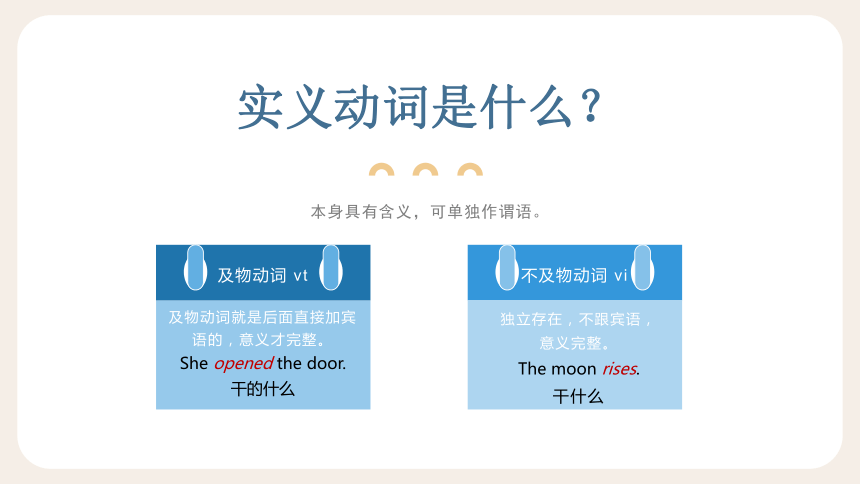
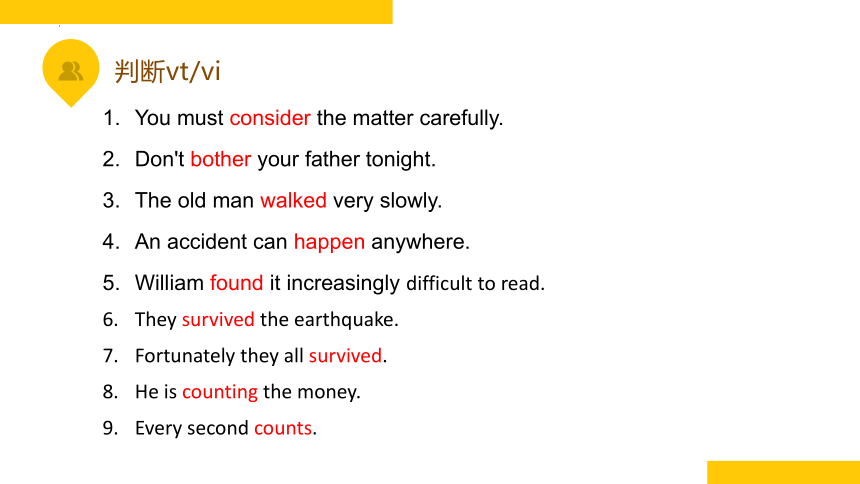
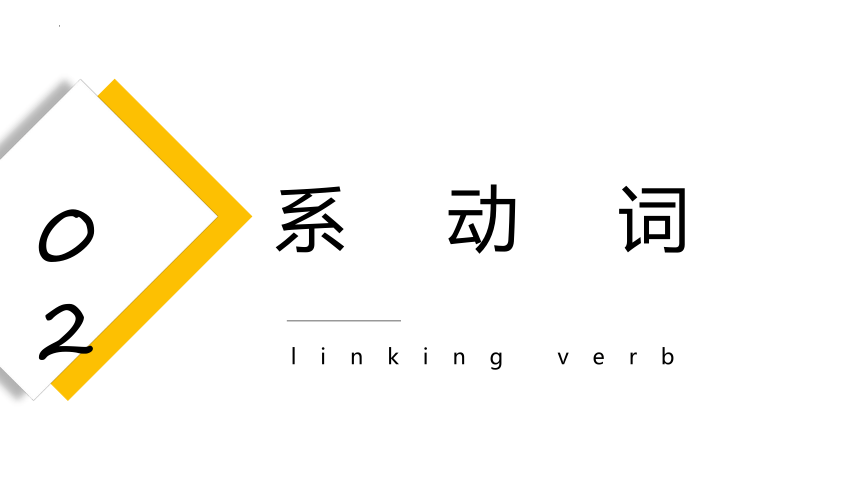
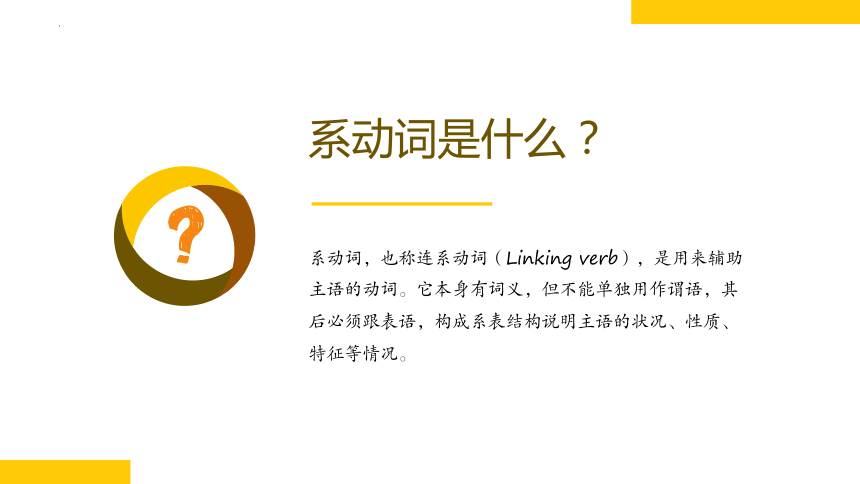
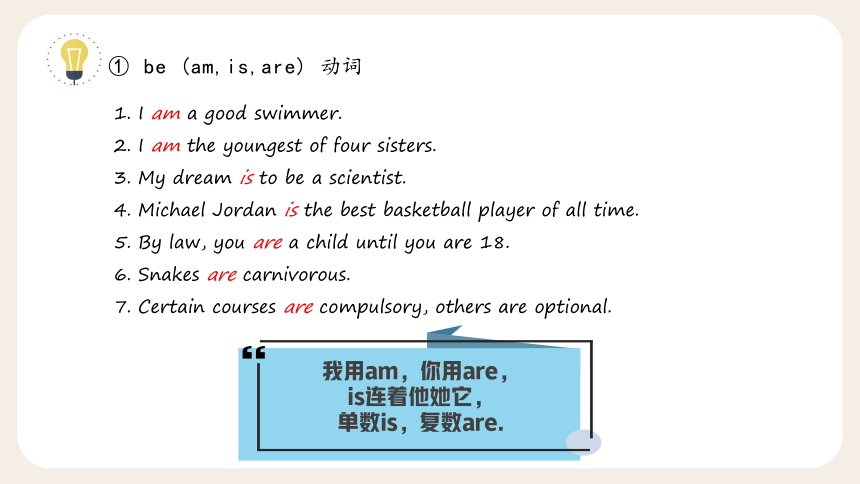


文档简介
(共55张PPT)
动 词
verb
Part 1
Part 2
Part 3
Part 4
实义动词
系动词
助动词
情态动词
Notional verb
Linking verb
Auxiliary
Modal verb
动词是什么?
指用来表示动作或状态的词汇。
句子核心,时态语态都要在动词上面变化。
become
01
read
03
walk
06
learn
02
happen
04
run
05
动词是什么?
指用来表示动作或状态的词汇。
句子核心,时态语态都要在动词上面变化。
表示动作行为:说、看、走、听、笑、拿、飞、跑、闻、摸、批评、宣传、保卫、学习、研究、进行、开始、停止
表示心理活动:想、爱、恨、怕、想念、打算、喜欢、希望、害怕、担心、讨厌、觉得、思考
表示存在、发展、变化、消失:在、死、有、等于、发生、演变、发展、生长、死亡、存在、消灭
表示趋向(趋向动词):上、下、进、出、回、起、来、上来、下来、进来、出来、回来、开来、过来、起来
01
实义动词
notional verb
实义动词是什么?
本身具有含义,可单独作谓语。
不及物动词 vi
及物动词 vt
及物动词就是后面直接加宾语的,意义才完整。
She opened the door.
干的什么
独立存在,不跟宾语,
意义完整。
The moon rises.
干什么
判断vt/vi
You must consider the matter carefully.
Don't bother your father tonight.
The old man walked very slowly.
An accident can happen anywhere.
William found it increasingly difficult to read.
They survived the earthquake.
Fortunately they all survived.
He is counting the money.
Every second counts.
02
系动词
linking verb
系动词是什么?
系动词,也称连系动词(Linking verb),是用来辅助主语的动词。它本身有词义,但不能单独用作谓语,其后必须跟表语,构成系表结构说明主语的状况、性质、特征等情况。
It is beter to die on one's feet than to live on
。than用作连词,其后接(省
one's knees. 站着死胜于跪着生。
略的)比较从句,或用作介
Ianived earlier than they did. 我到的比他们早。
词,其后跟宾语。如果than
后的动词与其前的动词,
He is richer than us all. 他比我们都富有。
样时,than后的动词可用
(单项与一组比较)
do(es)/did取代。
They work harder than you do.他们工作比你们努力。(两组之问进行比较)
She is more diligent than inteligent.她勤奋多于聪明。(同一人的两个特点比较)
be (am,is,are) 动词
I am a good swimmer.
I am the youngest of four sisters.
My dream is to be a scientist.
Michael Jordan is the best basketball player of all time.
By law, you are a child until you are 18.
Snakes are carnivorous.
Certain courses are compulsory, others are optional.
我用am,你用are,
is连着他她它,
单数is,复数are.
It is beter to die on one's feet than to live on
。than用作连词,其后接(省
one's knees. 站着死胜于跪着生。
略的)比较从句,或用作介
Ianived earlier than they did. 我到的比他们早。
词,其后跟宾语。如果than
后的动词与其前的动词,
He is richer than us all. 他比我们都富有。
样时,than后的动词可用
(单项与一组比较)
do(es)/did取代。
They work harder than you do.他们工作比你们努力。(两组之问进行比较)
She is more diligent than inteligent.她勤奋多于聪明。(同一人的两个特点比较)
be (am,is,are) 动词
[ V , adv./prep. ] 位于;在(某处)
The town is three miles away. 镇子距此地三英里远。
Mary's upstairs. 玛丽在楼上。
[ V , adv./prep. ] (在某时或某地)发生
The party is on Friday evening. 聚会定于周五晚上举行。
It is beter to die on one's feet than to live on
。than用作连词,其后接(省
one's knees. 站着死胜于跪着生。
略的)比较从句,或用作介
Ianived earlier than they did. 我到的比他们早。
词,其后跟宾语。如果than
后的动词与其前的动词,
He is richer than us all. 他比我们都富有。
样时,than后的动词可用
(单项与一组比较)
do(es)/did取代。
They work harder than you do.他们工作比你们努力。(两组之问进行比较)
She is more diligent than inteligent.她勤奋多于聪明。(同一人的两个特点比较)
be (am,is,are) 动词
[ V , adj./prep./n. ] “是”
She's from Italy. 她是意大利人。
Today is Monday. 今天是星期一。
“Who is that ” “It's my brother.” “那个人是谁?”“是我哥哥。”
She's a great beauty. 她是个大美人。
Luckily, I am a good swimmer. 幸好我是个游泳好手。
Susan is a doctor. 苏珊是医生。
It is beter to die on one's feet than to live on
。than用作连词,其后接(省
one's knees. 站着死胜于跪着生。
略的)比较从句,或用作介
Ianived earlier than they did. 我到的比他们早。
词,其后跟宾语。如果than
后的动词与其前的动词,
He is richer than us all. 他比我们都富有。
样时,than后的动词可用
(单项与一组比较)
do(es)/did取代。
They work harder than you do.他们工作比你们努力。(两组之问进行比较)
She is more diligent than inteligent.她勤奋多于聪明。(同一人的两个特点比较)
be (am,is,are) 动词
[ V-ADJ ]
It's beautiful! 美呀!
Life is unfair. 人生没有公平。
Eggs are easy to cook. 鸡蛋容易烹煮。
It was really hot in the sauna. 桑拿浴的确很热。
It's strange how she never comes to see us any more. 奇怪,她怎么再也不来看我们了。
用于表达时间
It's two thirty. 现在是两点三十。
practice time
I____a boy.
The girl____Jack's sister.
The dog____tall and fat.
The man with big eyes____a teacher.
Where____your mother She____at home.
Mike and Liu Tao____at school.
That____my red skirt.
The black gloves____for Su Yang.
This pair of gloves____for Yang Ling.
The two cups of milk____for me.
Some tea____in the glass.
My sister's name____Nancy.
We____very sad to hear that you____leaving.
am
is
is
is
is
is
are
is
are
is
are
is
is
are
are
seem,appear 表象
keep,stay,remain 持续
(表示主语继续或保
持一种状况或态度)
become,go,get,
turn,grow
变化
(表示主语变成什么样)
表象变化持续
表象变化持续
seem,appear 表象
He seems/appears (to be) very nervous.
The explosions seemed quite close by.
The man seemed to be ill.
She seems (to be) a very efficient salesperson.
He appears to know this.
They appeared not to know what was happening.
There appears to have been a mistake.
to be 在alive, alone, asleep, awake前不能省略。
I didn’t go in because she appeared to be asleep.
keep,stay,remain 持续
(表示主语继续或保持一种状况或态度)
The noise kept him awake.
People had to burn these trees to keep warm during harsh winters.
He never stays angry for long.
I can't stay awake any longer.
The store stays open until late on Thursdays.
The three men remained silent.
Train fares are likely to remain unchanged.
remain standing/seated/motionless
表象变化持续
become,go,get,
turn,grow
变化
(表示主语变成什么样)
become较get正式。两者均指人的感情、身体状况、自然或社会的变化。
It was becoming more and more difficult to live on his salary.
It soon became apparent that no one was going to come.
She was becoming confused.
She became queen in 1952.
Dr Smith became an adviser to the US government.
The bill will become law next year.
He became recognised as the leading authority on the subject.
Their bodies have become adapted to living at high altitudes.
表象变化持续
grow old/bored/calm 变老;腻烦起来;平静下来
As time went on he grew more and more impatient.
The skies grew dark and it began to rain.
I grew a little afraid of the guy next door.
He's growing old.
+to 逐渐开始
I'm sure you'll grow to like her in time.
我肯定你慢慢就会喜欢她了。
become,go,get,
turn,grow
变化
(表示主语变成什么样)
表象变化持续
在非正式文体中,get常构成以下词组使用:
get broken, get dressed, get killed, get lost, get married, get washed,
get excited, get dark, get pregnant, get tired.
Don't get upset about it!
Where did you live before you got married
go turn可以用来表示颜色变化:
The traffic lights turned/went green and I pulled away.
go 还可以用来表示负面变化/不良后果:
go bad/off/mouldy (food), go dead (a telephone), go missing, and go wrong.
The children went completely crazy/wild at the party.
My computer’s gone wrong again.
turn 可以表达到了...年纪:
He turned sixty last year.
become,go,get,
turn,grow
变化
(表示主语变成什么样)
表象变化持续
It is better to die on one's feet than to live on
。than用作连词,其后接(省
one's knees. 站着死胜于跪着生。
略的)比较从句,或用作介
Ianived earlier than they did. 我到的比他们早。
词,其后跟宾语。如果than
后的动词与其前的动词,
He is richer than us all. 他比我们都富有。
样时,than后的动词可用
(单项与一组比较)
do(es)/did取代。
They work harder than you do.他们工作比你们努力。(两组之问进行比较)
She is more diligent than inteligent.她勤奋多于聪明。(同一人的两个特点比较)
This book is more practical than scholarly 这本书实用性强,较少学究气。
He is a little (bit) older than me/l am. 他比我稍大一点儿。
感官系动词 feel, smell, sound, taste, look
“感觉起来(摸)/闻/听/尝/看起来...”
This kind of cloth feels very soft.
This flower smells very sweet.
Do I sound envious I pity them, actually.
The leaves taste rather bitter.
Those look riper than these.
The brothers look very similar.
The room smelled of lemons.
What does the perfume smell like
practice time
The animals seemed to be coming nearer.
I could now hear Jane calling, and she seemed to be close by.
It was a very serious illness but she appears to be recovering.
There seems to be a connection between the disease and exposure to radiation.
He says he's leaving and he seems to be serious this time.
Dr Hickman appeared to be alone so I walked straight into his office.
She seems to be a very kind and thoughtful person.
Susan went to bed hours ago but she still seems to be awake.
It appears to be an excellent opportunity for me to get more experience.
划出下面不必要的to be
practice time
划出下面合适的选项
Sorry I'm late. I became/got lost.
Although he was young, he became/got regarded by the people as their leader.
It's time to go to school. Become/Get ready quickly!
She became/got a minister in the government in 1981.
As the microscope was focused, the bacteria became/got visible.
The children became/got really excited on Christmas Eve.
As his condition worsened his speech became/got unintelligible.
practice time
用went 或者turned 填空
Just like his father, he_______bald before he was thirty.
Having now_______forty, he feels that his footballing career is coming to an end.
I was so dirty, the water in the bath_______black as soon as I stepped into it.
When I picked up the receiver, the line_______dead.
When we broke the news to Val, her face_______white and she collapsed.
The jewels_______missing at exactly the same time as the child vanished.
When Germany scored for a seventh time, the crowd_______wild with excitement.
turned
went
went
turned
went
went
turned
went
went
practice time
用 feel,look,smell,sound,taste 填空
The milk______strong.
My sweater______soft.
The room_______quiet.
These flowers______beautiful!
This pizza______delicious.
tastes
feels
sounds
look
smells
03
助动词
Auxiliary Verb
助动词是什么?
助动词用来构成时态和语态,
助动词具有语法意义,
没有词汇意义,不可单独作谓语。
It is better to die on one's feet than to live on
。than用作连词,其后接(省
one's knees. 站着死胜于跪着生。
略的)比较从句,或用作介
Ianived earlier than they did. 我到的比他们早。
词,其后跟宾语。如果than
后的动词与其前的动词,
He is richer than us all. 他比我们都富有。
样时,than后的动词可用
(单项与一组比较)
do(es)/did取代。
They work harder than you do.他们工作比你们努力。(两组之问进行比较)
She is more diligent than inteligent.她勤奋多于聪明。(同一人的两个特点比较)
This book is more practical than scholarly 这本书实用性强,较少学究气。
He is a little (bit) older than me/l am. 他比我稍大一点儿。
点击输入文本信息,简要陈述文本信息,字体大小可调节。点击输入文本信息
班级情况介绍
点击输入文本信息,简要陈述文本信息,字体大小可调节。点击输入文本信息
班情况介绍
基本助动词只有三个:be,do,have
4
与not合用,构成否定句,
I do not (=don’t )like him.
3
构成疑问句
Do you like college life
Did you study English before you came here
1
表示时态
He is singing.
He has got married.
5
加强肯定或祈使语气,
Do come to the party tomorrow evening.
He does know that.
2
表示语态
He was sent to England.
04
情态动词
Modal Verb
情态动词是什么?
主要用来表达看法或意见,
提出建议或表现说话者的态度等。
不能独立作谓语,后面动词用原形。
can (could), may (might), must, need, ought to,
dare (dared), shall (should), will (would)。
will和shall的用法 ( 'll won't would 'd wouldn't )
用来构成将来时态。shall用于第一人称主语,
Will用于其他人称,现在基本所有人称都用will。
We shall be very happy to see you. 我们将非常高兴见到你。
Mary and I will take the four o'clock train. 我和玛丽乘4点的火车。
The show will be open to the public at 2 p.m.. 展览将于下午2点对公众开放。
来提出建议,征求意见,询问愿望或打算等。
Shall I/we.. 意为“...好吗?要不要……?”(shall基本上不怎么用,尤其在北美英语中。
shall目前只与I和we连用,且听起来常显得正式并过时。)
Shall we go out for a walk?我们出去散步好吗?
Shall I send you the book 我把书给你寄去,好不好?
will
(表示愿意)愿,要,会,定要。
I'll check this letter for you, if you want. 你要是愿意,我会给你查查这封信的。
They won't lend us any more money. 他们不愿再借给我们钱了。
He wouldn't come—he said he was too busy. 他不愿来,他说他太忙。
We said we would keep them. 我们说过要保存它们的。
劳烦别人做事时用。
Will you send this letter for me, please 请你替我把这封信寄出去行吗?
I asked him if he wouldn't mind calling later. 我问他能否过会儿再来电话。
would (’d wouldn't)
Will的过去式,“将,将会,愿,要,”
He said he would be here at eight o'clock.
他说他将在八点钟到达这里。
She asked if I would help.
她问我是否会帮忙。
They told me that they probably wouldn't come.
他们对我说他们多半不会来。
They said they would give the police their full cooperation.
他们说他们愿意同警方通力合作。
He wouldn't say where he had picked up the information.
他不愿意说出他是在哪里得到这个消息的。
would (’d wouldn't)
表示请求、建议、邀请或征求意见。
Wouldn't you.. /Would you... /Would you like..
(可以与Will you..换用,但语气有更多的探询含意,更委婉客气,暗示说话者不太自信。)
Would you pay me in cash?
请付我现金,好吗?
Would you mind waiting for a moment
可以等一下吗?
would rather表示选择,意为 “宁愿,宁可”
Kids would rather play than study.
孩子们宁愿玩而不愿学习。
I would rather be the one sick than you.
我宁愿生病的人是我,而不是你。
They would rather work than live on welfare.
他们宁愿工作而不愿靠社会保障金过活。
I would rather pay for a meal than watch nine friends pick over and split a bill.
我宁愿付整顿饭钱而不愿看着9个朋友仔细算计、分摊账单。
They would rather struggle for peace.
他们宁愿为和平而奋斗。
can/could
表示现在或将来的能力(指体力,知识,技能和智力等方面的潜在的能力)。
He can't drive a car. 他不会开车。
This car can hold five persons. 这辆车能坐5人。
can表示主语原本就具有的某种能力。
be able to 表示通过努力可以具备某种能力或实现某种状态,
重点强调的是要有一个努力的过程。
(1) I can play the piano.(隐含着我本来就会弹钢琴的意思)
(2) I am able to play the piano.(隐含着我只要努力就有能力学会弹钢琴的意思)
can/could
表示过去的能力。
They couldn't reach the top of the mountain yesterday.
他们昨天未能登上山顶。
He could drive a car by the time he was sixteen.
他16岁就会开车。
He felt rested and could at last get to work.
他觉得已经休息过来,总算可以恢复工作了。
I could run fast when I was young, but now I can't.
我年轻时跑得很快,但现在不行了。
can/could
表示现在或过去的可能性(用来推断人或事物的特性,不能用be able to代替)。
can/could+be+形容词/名词
The news cannot be true. 这消息不可能是真的。
You can't be serious. 你不会是当真的。
Accidents can happen. 事故可能会发生。
Mary could be very unpleasant at times. 玛丽有时很令人讨厌。
can/could
表示请求允许“可以”could 较can 客气,may/might更为客气。
Can I take a photograph 我可以拍个照吗?
Can we speak privately 我们能单独谈谈吗?
Can we change seats 咱们可以交换一下座位吗?
Can I invite Mary 我可以邀请玛丽吗?
Can I come too 我也可以来吗?
表示命令,提议
If you don't behave, you can leave the room. 你要是表现不好,就出去。
You can't park your car in this street. 你不可以将车停在这条街上。
Visitors cannot litter the ground with paper. 游客不得随地乱扔废纸。
may/ might
(有可能但不肯定)也许,可能
We may have some rain today.
今天可能会下点雨。
I may be back next year.
我可能明年回来。
Civil rights officials say there may be hundreds of other cases of racial violence.
负责公民权利的官员说可能有几百起其他的种族暴力案件。
He said he might come tomorrow.
他说他明天可能来。
may/ might
(征求同意或表示允许)可以。
May I come in 我可以进来吗?
You may come in if you wish. 你想进来就进来吧。
May I offer you some refreshment 可以请您吃点喝点什么吗?
May I have your full name 我能知道您的全名吗?
3. 用于感叹句中可以表示祝愿或愿望。
May you do well! 祝你好运!
May you have a good time! 祝你玩得愉快!
may/ might
might
(1)用作may的过去式。
We didn’t know that he might be our new teacher. 我们不知道他可能是我们的新老师。
The accident might happen the day before yesterday. 事故可能发生在前天。
(2)替代may来表示现在时间的动作,主要于推测(但其可能性比may更低)。
I’m afraid it might snow tomorrow. 我担心明天可能会下雪。
You might meet him at the conference. 你可能会在会议上遇到他。
The movie might have finished now. 电影可能已经结束了。
(3)委婉地表示请求(不是过去式)。
Might I ask you a question 我可以问你一个问题吗
Might you go there with me 你能和我一起去吗
must (mustn't )
必须 (表示重要或必要,义务或强制性的劝告)。
You must do as you are told. 告诉你怎么做,你就要怎么做。
In China, traffic must keep to the right. 中国是右侧通行。
Drivers must not exceed the speed limit.司机不能超速。
You are going to have to take a certain amount of criticism, but you must cope with it.
你会受到一定程度的批评,但这是你必须面对的。
You mustn't leave the gate open. 你一定不要让大门敞开着。
I mustn't be late or Dad will go up the wall. 我不能晚了,否则爸爸会发脾气的。
We mustn't let ourselves be overtaken by our competitors. 我们决不能让竞争对手超过我们。
You mustn't break your promise. 你一定不能违背诺言。
You mustn't drive after drinking. 你绝不能酒后驾车。
对比 must have to must not don’t have to
must:used to say that sth is necessary or very important (sometimes involving a rule or a law).
have to:较常用于北美英语,尤其是口语中。
在英国英语中,两词之间有差异。must是基于说话者或听话者的主观意愿,have to关乎规定、法律和他人的愿望:
I must finish this essay today. I'm going out tomorrow. 我今天一定要完成这篇论文,因为我明天要出去。
I have to finish this essay today. We have to hand them in tomorrow. 我今天得完成这篇论文,因为我们明天必须交。
在否定句中,must not用于告诉某人不要做某事,表示没有必要做某事用don't have to。
Passengers must not smoke until the signs have been switched off. 指示灯未熄灭之前乘客不许抽烟。
You don’t have to pay for the tickets in advance. 你不必预付票款。
She doesn’t have to work at weekends. 她周末不用上班。
must (mustn't )
肯定 (表示有把握的猜测)。
At 29 Russell must be one of the youngest ever international referees.
29岁的拉塞尔想必是迄今为止最年轻的国际裁判之一。
"You must be Emma," said the visitor.
“你一定是埃玛,”来访者说道。
Miss Holloway had a weak heart. She must have had a heart attack.
霍洛韦小姐心脏衰弱。她一定得过心脏病。
need (needn’t)(也可以做实义动词)
需要、义务。
She need not do it herself. 她不需亲自做。
He needn't work so hard. 他不需要干得那么累。
Need I go right now 我需要马上走吗?
We need some expert help. 我们需要一些内行的帮助。(实义动词)
Children need a caring environment. 儿童需要一个充满关怀的环境。(实义动词)
should (shouldn't )
应该(主观义务)(ought to 比should 语气略强,多表示客观义务)。
I should exercise more. 我应该多锻炼。
Should our children be taught to swim at school 我们的孩子应该在学校学游泳吗?
Maybe you should socialize more. 也许你应该多和人交往。
They shouldn’t be too alarmed by the press reports. 他们不应该被媒体报道搞得过于恐慌。
Tea ought to be drunk hot. 茶要喝热的。
We ought to follow the rules at all times. 我们应该时时都要遵守规则。
should (shouldn't )
(表示预期)应该会,可能。
We should arrive before dark.
我们天黑以前应该能赶到。
I should have finished the book by Friday.
到星期五我应该能读完那本书。
The roads should be less crowded today.
今天路上该不那么拥挤了吧。
dare (daren’t) 敢; 竟敢(也可以做实义动词)
How dare you !
你竟敢!
He dare not/daren't ask her about the matter.
他不敢问她这件事。
I dare say you know about it already.
你敢说你已经知道了。
I daren’t tell her the truth.
我不敢对她讲实话。
情态动词主要用法总结-请求
I'm afraid you can't.
No, I'm afraid not.
I'm sorry, you can't.
I'd rather you didn't.
否定回答
Certainly.
Sure/OK.
Yes, certainly.
Of course.
Yes, of course.
肯定回答
Can I...?
语气比较随便、常用在熟人之间。
Could I...?
较为客气、略带犹豫。
May I...?
比上述两种更为正式、更客气。
Might I...?
最客气,相当正式,有礼貌(不
常用)
请求他人允许
(说话者做…)
A: Can/ Could/ May I borrow your bike B: No, I’m afraid not.
A: Can I go out and play? B: No, you can't.
A: May I come in? B: Yes, you may.
B: No. You may not.
情态动词主要用法总结-请求
I'd like to,
but(I can't...)
No, I'm afraid I can't.
否定回答
Yes, I'd/I would be happy to /glad to.
Certainly.
Yes, of course.
Sure.
肯定回答
Can you..?
用于非正式的场合,比较随便。
Could you..?
非正式的请求或建议。
Will you..?
除表示“请求”外,还可用作一般
疑问句。
Would you..?
常用来代替will you,暗示说话
者缺乏自信,不太肯定。
有礼貌地请求或建议(他人做某事)
Can/ Could you (please) open the door for me
Will/ Would/ Could/ Can you help me to lift this box
Will you be back early this evening
情态动词主要用法总结-可能性
<50%
99%
90%
may,might
He may/might be late.
他可能迟到。
must, should
He must be late
他肯定迟到。
只能用can和could的否定式
He couldn't/can't be late.
他不可能迟到。
practice time
用should,may或者must填空
A timetable_______be set for withdrawing the army.
—I wonder how old Mike is —He_______be well over 50.
If you smell gas, you_______phone the emergency number.
You_______try to visit Nepal - It's a beautiful country.
—I only live a couple of minutes from the town centre.
—It_______be handy having shops nearby.
Some people who don't like to talk much are not necessarily shy;
they______ just be quiet people.
—_______ I take the book out —I'm afraid not.
must
must
must
should
must
may
May
practice time
用can, could或者be able to填空
I had some free time yesterday, so I___________ write a few letters.
Watch this, Mum; I__________stand on one leg.
The plans were destroyed before they_________be read by the invading army.
The game________be played by up to six people.
Despite yesterday's snowfalls, we_____________ drive home in less than an hour.
I was very busy at work, but I___________ take a short holiday over Christmas.
was able to
can
could
can
were able to
was able to
用have to或者must(mustn’t)填空
He's got a lung problem and he_________go to hospital every two weeks.
That's really good news. I________tell my friend, Steve.
I always sleep through the alarm clock. My Dad________wake me every morning.
As I won't be at home tonight, I________do my homework during my lunch break.
Can we meet on Thursday morning —Sorry, no. I_________go to the dentist at 11.00.
I'm feeling really unfit. I________take more exercise.
—May I take this book out of the reading room —No,you________. You read it in here.
has to
must
has to
have to
have to
must
mustn’t
Thank you
动 词
verb
Part 1
Part 2
Part 3
Part 4
实义动词
系动词
助动词
情态动词
Notional verb
Linking verb
Auxiliary
Modal verb
动词是什么?
指用来表示动作或状态的词汇。
句子核心,时态语态都要在动词上面变化。
become
01
read
03
walk
06
learn
02
happen
04
run
05
动词是什么?
指用来表示动作或状态的词汇。
句子核心,时态语态都要在动词上面变化。
表示动作行为:说、看、走、听、笑、拿、飞、跑、闻、摸、批评、宣传、保卫、学习、研究、进行、开始、停止
表示心理活动:想、爱、恨、怕、想念、打算、喜欢、希望、害怕、担心、讨厌、觉得、思考
表示存在、发展、变化、消失:在、死、有、等于、发生、演变、发展、生长、死亡、存在、消灭
表示趋向(趋向动词):上、下、进、出、回、起、来、上来、下来、进来、出来、回来、开来、过来、起来
01
实义动词
notional verb
实义动词是什么?
本身具有含义,可单独作谓语。
不及物动词 vi
及物动词 vt
及物动词就是后面直接加宾语的,意义才完整。
She opened the door.
干的什么
独立存在,不跟宾语,
意义完整。
The moon rises.
干什么
判断vt/vi
You must consider the matter carefully.
Don't bother your father tonight.
The old man walked very slowly.
An accident can happen anywhere.
William found it increasingly difficult to read.
They survived the earthquake.
Fortunately they all survived.
He is counting the money.
Every second counts.
02
系动词
linking verb
系动词是什么?
系动词,也称连系动词(Linking verb),是用来辅助主语的动词。它本身有词义,但不能单独用作谓语,其后必须跟表语,构成系表结构说明主语的状况、性质、特征等情况。
It is beter to die on one's feet than to live on
。than用作连词,其后接(省
one's knees. 站着死胜于跪着生。
略的)比较从句,或用作介
Ianived earlier than they did. 我到的比他们早。
词,其后跟宾语。如果than
后的动词与其前的动词,
He is richer than us all. 他比我们都富有。
样时,than后的动词可用
(单项与一组比较)
do(es)/did取代。
They work harder than you do.他们工作比你们努力。(两组之问进行比较)
She is more diligent than inteligent.她勤奋多于聪明。(同一人的两个特点比较)
be (am,is,are) 动词
I am a good swimmer.
I am the youngest of four sisters.
My dream is to be a scientist.
Michael Jordan is the best basketball player of all time.
By law, you are a child until you are 18.
Snakes are carnivorous.
Certain courses are compulsory, others are optional.
我用am,你用are,
is连着他她它,
单数is,复数are.
It is beter to die on one's feet than to live on
。than用作连词,其后接(省
one's knees. 站着死胜于跪着生。
略的)比较从句,或用作介
Ianived earlier than they did. 我到的比他们早。
词,其后跟宾语。如果than
后的动词与其前的动词,
He is richer than us all. 他比我们都富有。
样时,than后的动词可用
(单项与一组比较)
do(es)/did取代。
They work harder than you do.他们工作比你们努力。(两组之问进行比较)
She is more diligent than inteligent.她勤奋多于聪明。(同一人的两个特点比较)
be (am,is,are) 动词
[ V , adv./prep. ] 位于;在(某处)
The town is three miles away. 镇子距此地三英里远。
Mary's upstairs. 玛丽在楼上。
[ V , adv./prep. ] (在某时或某地)发生
The party is on Friday evening. 聚会定于周五晚上举行。
It is beter to die on one's feet than to live on
。than用作连词,其后接(省
one's knees. 站着死胜于跪着生。
略的)比较从句,或用作介
Ianived earlier than they did. 我到的比他们早。
词,其后跟宾语。如果than
后的动词与其前的动词,
He is richer than us all. 他比我们都富有。
样时,than后的动词可用
(单项与一组比较)
do(es)/did取代。
They work harder than you do.他们工作比你们努力。(两组之问进行比较)
She is more diligent than inteligent.她勤奋多于聪明。(同一人的两个特点比较)
be (am,is,are) 动词
[ V , adj./prep./n. ] “是”
She's from Italy. 她是意大利人。
Today is Monday. 今天是星期一。
“Who is that ” “It's my brother.” “那个人是谁?”“是我哥哥。”
She's a great beauty. 她是个大美人。
Luckily, I am a good swimmer. 幸好我是个游泳好手。
Susan is a doctor. 苏珊是医生。
It is beter to die on one's feet than to live on
。than用作连词,其后接(省
one's knees. 站着死胜于跪着生。
略的)比较从句,或用作介
Ianived earlier than they did. 我到的比他们早。
词,其后跟宾语。如果than
后的动词与其前的动词,
He is richer than us all. 他比我们都富有。
样时,than后的动词可用
(单项与一组比较)
do(es)/did取代。
They work harder than you do.他们工作比你们努力。(两组之问进行比较)
She is more diligent than inteligent.她勤奋多于聪明。(同一人的两个特点比较)
be (am,is,are) 动词
[ V-ADJ ]
It's beautiful! 美呀!
Life is unfair. 人生没有公平。
Eggs are easy to cook. 鸡蛋容易烹煮。
It was really hot in the sauna. 桑拿浴的确很热。
It's strange how she never comes to see us any more. 奇怪,她怎么再也不来看我们了。
用于表达时间
It's two thirty. 现在是两点三十。
practice time
I____a boy.
The girl____Jack's sister.
The dog____tall and fat.
The man with big eyes____a teacher.
Where____your mother She____at home.
Mike and Liu Tao____at school.
That____my red skirt.
The black gloves____for Su Yang.
This pair of gloves____for Yang Ling.
The two cups of milk____for me.
Some tea____in the glass.
My sister's name____Nancy.
We____very sad to hear that you____leaving.
am
is
is
is
is
is
are
is
are
is
are
is
is
are
are
seem,appear 表象
keep,stay,remain 持续
(表示主语继续或保
持一种状况或态度)
become,go,get,
turn,grow
变化
(表示主语变成什么样)
表象变化持续
表象变化持续
seem,appear 表象
He seems/appears (to be) very nervous.
The explosions seemed quite close by.
The man seemed to be ill.
She seems (to be) a very efficient salesperson.
He appears to know this.
They appeared not to know what was happening.
There appears to have been a mistake.
to be 在alive, alone, asleep, awake前不能省略。
I didn’t go in because she appeared to be asleep.
keep,stay,remain 持续
(表示主语继续或保持一种状况或态度)
The noise kept him awake.
People had to burn these trees to keep warm during harsh winters.
He never stays angry for long.
I can't stay awake any longer.
The store stays open until late on Thursdays.
The three men remained silent.
Train fares are likely to remain unchanged.
remain standing/seated/motionless
表象变化持续
become,go,get,
turn,grow
变化
(表示主语变成什么样)
become较get正式。两者均指人的感情、身体状况、自然或社会的变化。
It was becoming more and more difficult to live on his salary.
It soon became apparent that no one was going to come.
She was becoming confused.
She became queen in 1952.
Dr Smith became an adviser to the US government.
The bill will become law next year.
He became recognised as the leading authority on the subject.
Their bodies have become adapted to living at high altitudes.
表象变化持续
grow old/bored/calm 变老;腻烦起来;平静下来
As time went on he grew more and more impatient.
The skies grew dark and it began to rain.
I grew a little afraid of the guy next door.
He's growing old.
+to 逐渐开始
I'm sure you'll grow to like her in time.
我肯定你慢慢就会喜欢她了。
become,go,get,
turn,grow
变化
(表示主语变成什么样)
表象变化持续
在非正式文体中,get常构成以下词组使用:
get broken, get dressed, get killed, get lost, get married, get washed,
get excited, get dark, get pregnant, get tired.
Don't get upset about it!
Where did you live before you got married
go turn可以用来表示颜色变化:
The traffic lights turned/went green and I pulled away.
go 还可以用来表示负面变化/不良后果:
go bad/off/mouldy (food), go dead (a telephone), go missing, and go wrong.
The children went completely crazy/wild at the party.
My computer’s gone wrong again.
turn 可以表达到了...年纪:
He turned sixty last year.
become,go,get,
turn,grow
变化
(表示主语变成什么样)
表象变化持续
It is better to die on one's feet than to live on
。than用作连词,其后接(省
one's knees. 站着死胜于跪着生。
略的)比较从句,或用作介
Ianived earlier than they did. 我到的比他们早。
词,其后跟宾语。如果than
后的动词与其前的动词,
He is richer than us all. 他比我们都富有。
样时,than后的动词可用
(单项与一组比较)
do(es)/did取代。
They work harder than you do.他们工作比你们努力。(两组之问进行比较)
She is more diligent than inteligent.她勤奋多于聪明。(同一人的两个特点比较)
This book is more practical than scholarly 这本书实用性强,较少学究气。
He is a little (bit) older than me/l am. 他比我稍大一点儿。
感官系动词 feel, smell, sound, taste, look
“感觉起来(摸)/闻/听/尝/看起来...”
This kind of cloth feels very soft.
This flower smells very sweet.
Do I sound envious I pity them, actually.
The leaves taste rather bitter.
Those look riper than these.
The brothers look very similar.
The room smelled of lemons.
What does the perfume smell like
practice time
The animals seemed to be coming nearer.
I could now hear Jane calling, and she seemed to be close by.
It was a very serious illness but she appears to be recovering.
There seems to be a connection between the disease and exposure to radiation.
He says he's leaving and he seems to be serious this time.
Dr Hickman appeared to be alone so I walked straight into his office.
She seems to be a very kind and thoughtful person.
Susan went to bed hours ago but she still seems to be awake.
It appears to be an excellent opportunity for me to get more experience.
划出下面不必要的to be
practice time
划出下面合适的选项
Sorry I'm late. I became/got lost.
Although he was young, he became/got regarded by the people as their leader.
It's time to go to school. Become/Get ready quickly!
She became/got a minister in the government in 1981.
As the microscope was focused, the bacteria became/got visible.
The children became/got really excited on Christmas Eve.
As his condition worsened his speech became/got unintelligible.
practice time
用went 或者turned 填空
Just like his father, he_______bald before he was thirty.
Having now_______forty, he feels that his footballing career is coming to an end.
I was so dirty, the water in the bath_______black as soon as I stepped into it.
When I picked up the receiver, the line_______dead.
When we broke the news to Val, her face_______white and she collapsed.
The jewels_______missing at exactly the same time as the child vanished.
When Germany scored for a seventh time, the crowd_______wild with excitement.
turned
went
went
turned
went
went
turned
went
went
practice time
用 feel,look,smell,sound,taste 填空
The milk______strong.
My sweater______soft.
The room_______quiet.
These flowers______beautiful!
This pizza______delicious.
tastes
feels
sounds
look
smells
03
助动词
Auxiliary Verb
助动词是什么?
助动词用来构成时态和语态,
助动词具有语法意义,
没有词汇意义,不可单独作谓语。
It is better to die on one's feet than to live on
。than用作连词,其后接(省
one's knees. 站着死胜于跪着生。
略的)比较从句,或用作介
Ianived earlier than they did. 我到的比他们早。
词,其后跟宾语。如果than
后的动词与其前的动词,
He is richer than us all. 他比我们都富有。
样时,than后的动词可用
(单项与一组比较)
do(es)/did取代。
They work harder than you do.他们工作比你们努力。(两组之问进行比较)
She is more diligent than inteligent.她勤奋多于聪明。(同一人的两个特点比较)
This book is more practical than scholarly 这本书实用性强,较少学究气。
He is a little (bit) older than me/l am. 他比我稍大一点儿。
点击输入文本信息,简要陈述文本信息,字体大小可调节。点击输入文本信息
班级情况介绍
点击输入文本信息,简要陈述文本信息,字体大小可调节。点击输入文本信息
班情况介绍
基本助动词只有三个:be,do,have
4
与not合用,构成否定句,
I do not (=don’t )like him.
3
构成疑问句
Do you like college life
Did you study English before you came here
1
表示时态
He is singing.
He has got married.
5
加强肯定或祈使语气,
Do come to the party tomorrow evening.
He does know that.
2
表示语态
He was sent to England.
04
情态动词
Modal Verb
情态动词是什么?
主要用来表达看法或意见,
提出建议或表现说话者的态度等。
不能独立作谓语,后面动词用原形。
can (could), may (might), must, need, ought to,
dare (dared), shall (should), will (would)。
will和shall的用法 ( 'll won't would 'd wouldn't )
用来构成将来时态。shall用于第一人称主语,
Will用于其他人称,现在基本所有人称都用will。
We shall be very happy to see you. 我们将非常高兴见到你。
Mary and I will take the four o'clock train. 我和玛丽乘4点的火车。
The show will be open to the public at 2 p.m.. 展览将于下午2点对公众开放。
来提出建议,征求意见,询问愿望或打算等。
Shall I/we.. 意为“...好吗?要不要……?”(shall基本上不怎么用,尤其在北美英语中。
shall目前只与I和we连用,且听起来常显得正式并过时。)
Shall we go out for a walk?我们出去散步好吗?
Shall I send you the book 我把书给你寄去,好不好?
will
(表示愿意)愿,要,会,定要。
I'll check this letter for you, if you want. 你要是愿意,我会给你查查这封信的。
They won't lend us any more money. 他们不愿再借给我们钱了。
He wouldn't come—he said he was too busy. 他不愿来,他说他太忙。
We said we would keep them. 我们说过要保存它们的。
劳烦别人做事时用。
Will you send this letter for me, please 请你替我把这封信寄出去行吗?
I asked him if he wouldn't mind calling later. 我问他能否过会儿再来电话。
would (’d wouldn't)
Will的过去式,“将,将会,愿,要,”
He said he would be here at eight o'clock.
他说他将在八点钟到达这里。
She asked if I would help.
她问我是否会帮忙。
They told me that they probably wouldn't come.
他们对我说他们多半不会来。
They said they would give the police their full cooperation.
他们说他们愿意同警方通力合作。
He wouldn't say where he had picked up the information.
他不愿意说出他是在哪里得到这个消息的。
would (’d wouldn't)
表示请求、建议、邀请或征求意见。
Wouldn't you.. /Would you... /Would you like..
(可以与Will you..换用,但语气有更多的探询含意,更委婉客气,暗示说话者不太自信。)
Would you pay me in cash?
请付我现金,好吗?
Would you mind waiting for a moment
可以等一下吗?
would rather表示选择,意为 “宁愿,宁可”
Kids would rather play than study.
孩子们宁愿玩而不愿学习。
I would rather be the one sick than you.
我宁愿生病的人是我,而不是你。
They would rather work than live on welfare.
他们宁愿工作而不愿靠社会保障金过活。
I would rather pay for a meal than watch nine friends pick over and split a bill.
我宁愿付整顿饭钱而不愿看着9个朋友仔细算计、分摊账单。
They would rather struggle for peace.
他们宁愿为和平而奋斗。
can/could
表示现在或将来的能力(指体力,知识,技能和智力等方面的潜在的能力)。
He can't drive a car. 他不会开车。
This car can hold five persons. 这辆车能坐5人。
can表示主语原本就具有的某种能力。
be able to 表示通过努力可以具备某种能力或实现某种状态,
重点强调的是要有一个努力的过程。
(1) I can play the piano.(隐含着我本来就会弹钢琴的意思)
(2) I am able to play the piano.(隐含着我只要努力就有能力学会弹钢琴的意思)
can/could
表示过去的能力。
They couldn't reach the top of the mountain yesterday.
他们昨天未能登上山顶。
He could drive a car by the time he was sixteen.
他16岁就会开车。
He felt rested and could at last get to work.
他觉得已经休息过来,总算可以恢复工作了。
I could run fast when I was young, but now I can't.
我年轻时跑得很快,但现在不行了。
can/could
表示现在或过去的可能性(用来推断人或事物的特性,不能用be able to代替)。
can/could+be+形容词/名词
The news cannot be true. 这消息不可能是真的。
You can't be serious. 你不会是当真的。
Accidents can happen. 事故可能会发生。
Mary could be very unpleasant at times. 玛丽有时很令人讨厌。
can/could
表示请求允许“可以”could 较can 客气,may/might更为客气。
Can I take a photograph 我可以拍个照吗?
Can we speak privately 我们能单独谈谈吗?
Can we change seats 咱们可以交换一下座位吗?
Can I invite Mary 我可以邀请玛丽吗?
Can I come too 我也可以来吗?
表示命令,提议
If you don't behave, you can leave the room. 你要是表现不好,就出去。
You can't park your car in this street. 你不可以将车停在这条街上。
Visitors cannot litter the ground with paper. 游客不得随地乱扔废纸。
may/ might
(有可能但不肯定)也许,可能
We may have some rain today.
今天可能会下点雨。
I may be back next year.
我可能明年回来。
Civil rights officials say there may be hundreds of other cases of racial violence.
负责公民权利的官员说可能有几百起其他的种族暴力案件。
He said he might come tomorrow.
他说他明天可能来。
may/ might
(征求同意或表示允许)可以。
May I come in 我可以进来吗?
You may come in if you wish. 你想进来就进来吧。
May I offer you some refreshment 可以请您吃点喝点什么吗?
May I have your full name 我能知道您的全名吗?
3. 用于感叹句中可以表示祝愿或愿望。
May you do well! 祝你好运!
May you have a good time! 祝你玩得愉快!
may/ might
might
(1)用作may的过去式。
We didn’t know that he might be our new teacher. 我们不知道他可能是我们的新老师。
The accident might happen the day before yesterday. 事故可能发生在前天。
(2)替代may来表示现在时间的动作,主要于推测(但其可能性比may更低)。
I’m afraid it might snow tomorrow. 我担心明天可能会下雪。
You might meet him at the conference. 你可能会在会议上遇到他。
The movie might have finished now. 电影可能已经结束了。
(3)委婉地表示请求(不是过去式)。
Might I ask you a question 我可以问你一个问题吗
Might you go there with me 你能和我一起去吗
must (mustn't )
必须 (表示重要或必要,义务或强制性的劝告)。
You must do as you are told. 告诉你怎么做,你就要怎么做。
In China, traffic must keep to the right. 中国是右侧通行。
Drivers must not exceed the speed limit.司机不能超速。
You are going to have to take a certain amount of criticism, but you must cope with it.
你会受到一定程度的批评,但这是你必须面对的。
You mustn't leave the gate open. 你一定不要让大门敞开着。
I mustn't be late or Dad will go up the wall. 我不能晚了,否则爸爸会发脾气的。
We mustn't let ourselves be overtaken by our competitors. 我们决不能让竞争对手超过我们。
You mustn't break your promise. 你一定不能违背诺言。
You mustn't drive after drinking. 你绝不能酒后驾车。
对比 must have to must not don’t have to
must:used to say that sth is necessary or very important (sometimes involving a rule or a law).
have to:较常用于北美英语,尤其是口语中。
在英国英语中,两词之间有差异。must是基于说话者或听话者的主观意愿,have to关乎规定、法律和他人的愿望:
I must finish this essay today. I'm going out tomorrow. 我今天一定要完成这篇论文,因为我明天要出去。
I have to finish this essay today. We have to hand them in tomorrow. 我今天得完成这篇论文,因为我们明天必须交。
在否定句中,must not用于告诉某人不要做某事,表示没有必要做某事用don't have to。
Passengers must not smoke until the signs have been switched off. 指示灯未熄灭之前乘客不许抽烟。
You don’t have to pay for the tickets in advance. 你不必预付票款。
She doesn’t have to work at weekends. 她周末不用上班。
must (mustn't )
肯定 (表示有把握的猜测)。
At 29 Russell must be one of the youngest ever international referees.
29岁的拉塞尔想必是迄今为止最年轻的国际裁判之一。
"You must be Emma," said the visitor.
“你一定是埃玛,”来访者说道。
Miss Holloway had a weak heart. She must have had a heart attack.
霍洛韦小姐心脏衰弱。她一定得过心脏病。
need (needn’t)(也可以做实义动词)
需要、义务。
She need not do it herself. 她不需亲自做。
He needn't work so hard. 他不需要干得那么累。
Need I go right now 我需要马上走吗?
We need some expert help. 我们需要一些内行的帮助。(实义动词)
Children need a caring environment. 儿童需要一个充满关怀的环境。(实义动词)
should (shouldn't )
应该(主观义务)(ought to 比should 语气略强,多表示客观义务)。
I should exercise more. 我应该多锻炼。
Should our children be taught to swim at school 我们的孩子应该在学校学游泳吗?
Maybe you should socialize more. 也许你应该多和人交往。
They shouldn’t be too alarmed by the press reports. 他们不应该被媒体报道搞得过于恐慌。
Tea ought to be drunk hot. 茶要喝热的。
We ought to follow the rules at all times. 我们应该时时都要遵守规则。
should (shouldn't )
(表示预期)应该会,可能。
We should arrive before dark.
我们天黑以前应该能赶到。
I should have finished the book by Friday.
到星期五我应该能读完那本书。
The roads should be less crowded today.
今天路上该不那么拥挤了吧。
dare (daren’t) 敢; 竟敢(也可以做实义动词)
How dare you !
你竟敢!
He dare not/daren't ask her about the matter.
他不敢问她这件事。
I dare say you know about it already.
你敢说你已经知道了。
I daren’t tell her the truth.
我不敢对她讲实话。
情态动词主要用法总结-请求
I'm afraid you can't.
No, I'm afraid not.
I'm sorry, you can't.
I'd rather you didn't.
否定回答
Certainly.
Sure/OK.
Yes, certainly.
Of course.
Yes, of course.
肯定回答
Can I...?
语气比较随便、常用在熟人之间。
Could I...?
较为客气、略带犹豫。
May I...?
比上述两种更为正式、更客气。
Might I...?
最客气,相当正式,有礼貌(不
常用)
请求他人允许
(说话者做…)
A: Can/ Could/ May I borrow your bike B: No, I’m afraid not.
A: Can I go out and play? B: No, you can't.
A: May I come in? B: Yes, you may.
B: No. You may not.
情态动词主要用法总结-请求
I'd like to,
but(I can't...)
No, I'm afraid I can't.
否定回答
Yes, I'd/I would be happy to /glad to.
Certainly.
Yes, of course.
Sure.
肯定回答
Can you..?
用于非正式的场合,比较随便。
Could you..?
非正式的请求或建议。
Will you..?
除表示“请求”外,还可用作一般
疑问句。
Would you..?
常用来代替will you,暗示说话
者缺乏自信,不太肯定。
有礼貌地请求或建议(他人做某事)
Can/ Could you (please) open the door for me
Will/ Would/ Could/ Can you help me to lift this box
Will you be back early this evening
情态动词主要用法总结-可能性
<50%
99%
90%
may,might
He may/might be late.
他可能迟到。
must, should
He must be late
他肯定迟到。
只能用can和could的否定式
He couldn't/can't be late.
他不可能迟到。
practice time
用should,may或者must填空
A timetable_______be set for withdrawing the army.
—I wonder how old Mike is —He_______be well over 50.
If you smell gas, you_______phone the emergency number.
You_______try to visit Nepal - It's a beautiful country.
—I only live a couple of minutes from the town centre.
—It_______be handy having shops nearby.
Some people who don't like to talk much are not necessarily shy;
they______ just be quiet people.
—_______ I take the book out —I'm afraid not.
must
must
must
should
must
may
May
practice time
用can, could或者be able to填空
I had some free time yesterday, so I___________ write a few letters.
Watch this, Mum; I__________stand on one leg.
The plans were destroyed before they_________be read by the invading army.
The game________be played by up to six people.
Despite yesterday's snowfalls, we_____________ drive home in less than an hour.
I was very busy at work, but I___________ take a short holiday over Christmas.
was able to
can
could
can
were able to
was able to
用have to或者must(mustn’t)填空
He's got a lung problem and he_________go to hospital every two weeks.
That's really good news. I________tell my friend, Steve.
I always sleep through the alarm clock. My Dad________wake me every morning.
As I won't be at home tonight, I________do my homework during my lunch break.
Can we meet on Thursday morning —Sorry, no. I_________go to the dentist at 11.00.
I'm feeling really unfit. I________take more exercise.
—May I take this book out of the reading room —No,you________. You read it in here.
has to
must
has to
have to
have to
must
mustn’t
Thank you
同课章节目录
